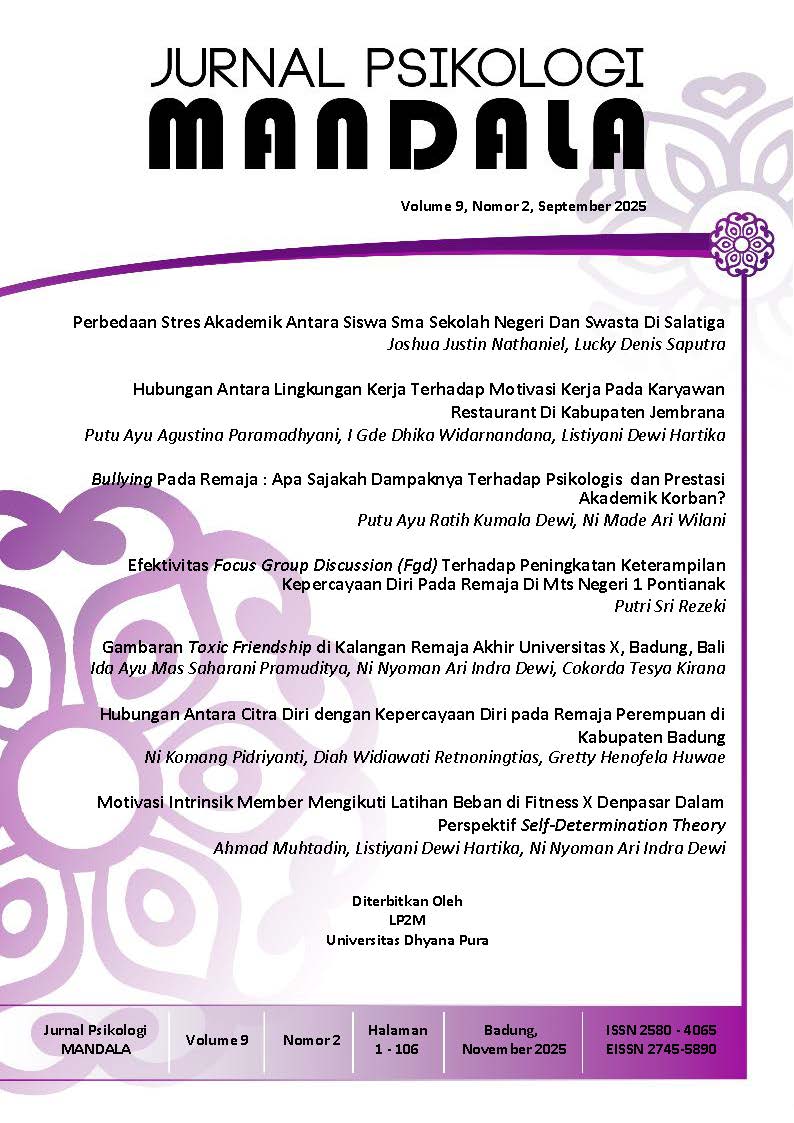Gambaran Toxic Friendship Di Kalangan Remaja Akhir Universitas X, Badung, Bali
Main Article Content
Abstract
Abstrak.
This study aims to describe the phenomenon of toxic friendship among late adolescents at University X, Badung, Bali. A toxic friendship is an unhealthy relationship characterized by manipulative and domineering behavior, a lack of empathy, and prolonged emotional pressure. This study employs a qualitative approach using the phenomenological method to explore the subjective experiences of students aged 18–21 who have experienced psychologically harmful friendships. Data were collected through in-depth interviews and observations of four primary informants and supporting informants. The results of the study indicate that toxic friendships arise due to low self-confidence, excessive emotional attachment, social pressure, and academic demands. The impacts felt include stress, social anxiety, overthinking, decreased enthusiasm, loss of motivation to study, and even the desire to withdraw from social environments or drop out of college. These findings emphasize the importance of awareness of healthy boundaries in friendships and the need for educational institutions to support the creation of a positive social environment to maintain students' psychological well-being.
Article Details

This work is licensed under a Creative Commons Attribution-NonCommercial-ShareAlike 4.0 International License.
![]()
This work is licensed under a Creative Commons Attribution-NonCommercial-ShareAlike 4.0 International License.
References
Creswell, J. W. (2018). Research Design: Qualitative, Quantitative, and Mixed Methods Approaches. by SAGE Publications, Inc.
Dryburgh, N. S. J., Martin-Storey, A., Craig, W. M., Holfeld, B., & Dirks, M. A. (2024). In the Friendships of Adolescents. Journal of Interpersonal Violence, 40(7-8), 1800–1823. https://doi.org/10.1177/08862605241265418
Esperansa, S. T., Siva, N., Putri Saraswati, I. A., Wisnawa, K. S. C., & Kistian, A. (2023). The Effect of Toxic Friendship on Students’ Mental Health. APLIKATIF: Journal of Research Trends in Social Sciences and Humanities, 2(2), 59–66. https://doi.org/10.59110/aplikatif.v2i2.124
Fadhilla, R., & Siregar, A. P. (2024). Dampak Lingkungan Pertemanan Toxic Terhadap Kesehatan Mental Remaja. Invention: Journal Research and Education Studies, 37–48. https://doi.org/10.51178/invention.v5i2.2017
Ilhamsyah, D. Y., & Borualogo, I. S. (2020). Pengaruh Kepuasan Pertemanan terhadap Subjective Well-Being Remaja Panti Asuhan. 6(2).
Imam, S. (2024). Dampak Toxic Friendship pada Remaja Masjid Qutbu Karomatul Atkiya (Studi Kasus Kegiatan Asrakalan di Kampung Mbah Dalam Kota Bogor). Maret 2024, 3(1), 50–56.
Nasution, N., & Rambe, F. N. (2023). Perspektif Komunikasi Interpersonal Pada Toxic Friendship. 2023, 4(2), 1–7.
Psikologi Indonesia, P. P. H. (2010). KODE ETIK PSIKOLOGI INDONESIA (1 ed.). Pengurus Pusat Himpunan Psikologi Indonesia.
Rahimah, S., Abidin, M. Z., & Fadhila, M. (2022). The Effect of Toxic Relationships in Friendship on The Psychological Well-Being of Islamic University Students. TAZKIYA Journal of Psychology, 10(2), 155–164. https://doi.org/10.15408/tazkiya.v10i2.27776
Rais, R. M. (2022). Kepercayaan Diri (Self Confidence) dan Perkembangannya Pada Remaja. 30 Juni 2022, 12(1). https://doi.org/10.30829/alirsyad.v12i1.11935
Roem, & Sarmiati. (2019). Komunikai Interpersonal (1 ed.). CV IRDH.
Sembodo, T., Ariffadillah, M., Nugroho, D. D., & Fanany, J. A. (2024). Upaya Penyelesaian Toxic Friendship Dengan Pendekatan Gestalt. 9(1), 73–80.
Simarmata, S., Batubara, A., & Ulfiani, R. (2023). Pengaruh Toxic Friendship Terhadap Self Esteem Siswa Smpit Al Falah Kutalimbaru. AL-IRSYAD, 13(2), 76. https://doi.org/10.30829/al-irsyad.v13i2.17122
Sugiyono. (2023). Metode Penelitian Kuantitatif Kualitatif dan R&D (5 ed.). ALFABETA, cv.
Tanjung, A., Yulianti, D., Juwita, D. R., Safitri, A. O., & Aqila, A. A. (2024). Peran Guru Bimbingan Konseling Dalam Mengatasi Toxic Friendship di SMA Negeri. 2.
